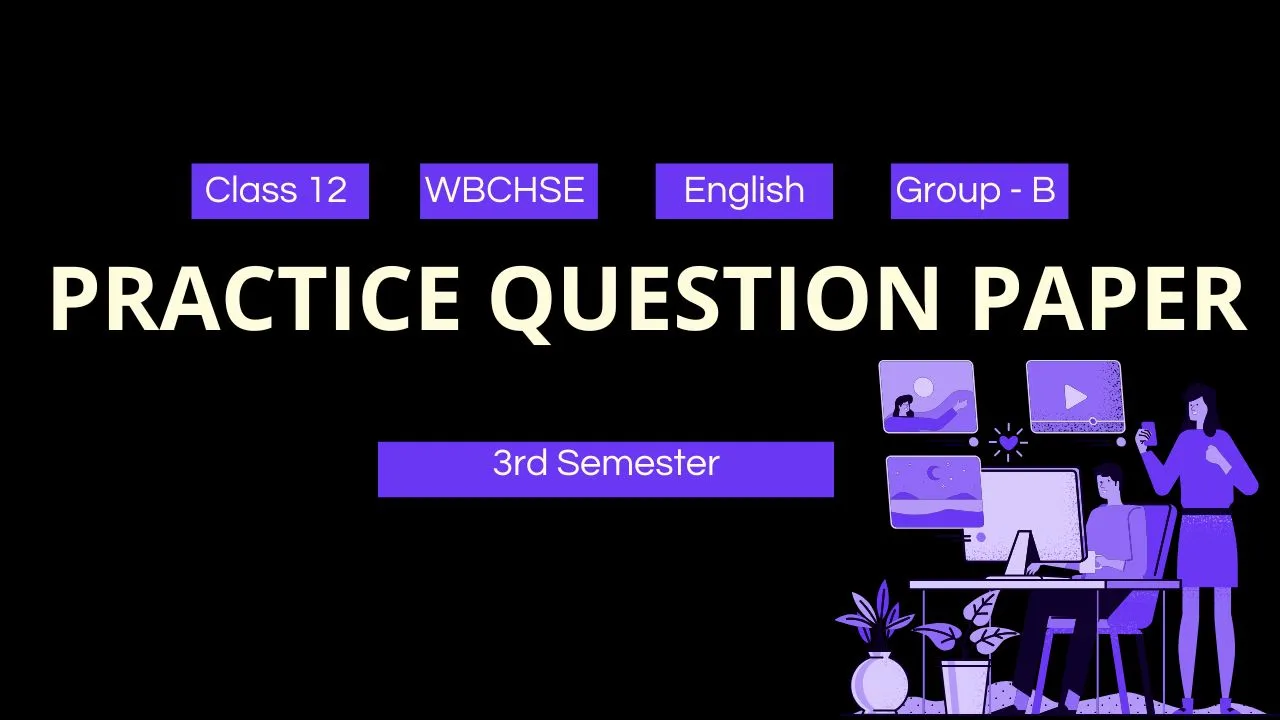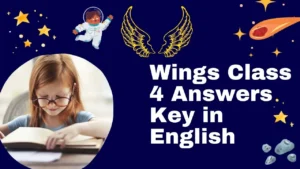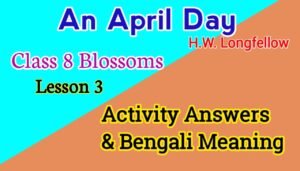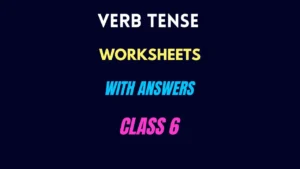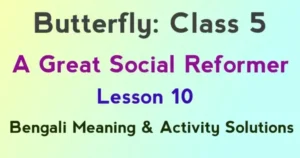Get the most relevant English Practice Question Paper for Class 12 (3rd Semester) under WBCHSE syllabus. Includes model questions from prose, poetry, drama, grammar, and comprehension based on the latest exam pattern. Download PDF and start preparing with confidence!
English Test: Class 12: 3rd Semester: FM – 40: Time 1h:15 min: Date: 15 05 2025
[Instruction: This Question Paper is divided into three parts – Literature, Textual Grammar, and Unseen Comprehension. Literature and Textual Grammar contain 15 marks each and Useen comprehension contains 10 marks. All questions are compulsory. All are MCQ-based questions. ]
(Literature) 15 marks
Choose the appropriate answer:
1. Why did the narrator feel sorry for Deoli station?
a) It was always crowded
b) It had no tea stall
c) No one ever got in or out of the train there
d) It was filled with wild animals
Download Class 12 English (B) Suggestions 3rd Semester PDF 2025
The Suggestive Notes cover a variety of MCQ questions and answers from prose, poetry, drama (Riders to the Sea), and textual grammar. With 25 Sample Question Paper Sets with Answers added. Get your complete PDF copy in one place now and start studying with confidence!
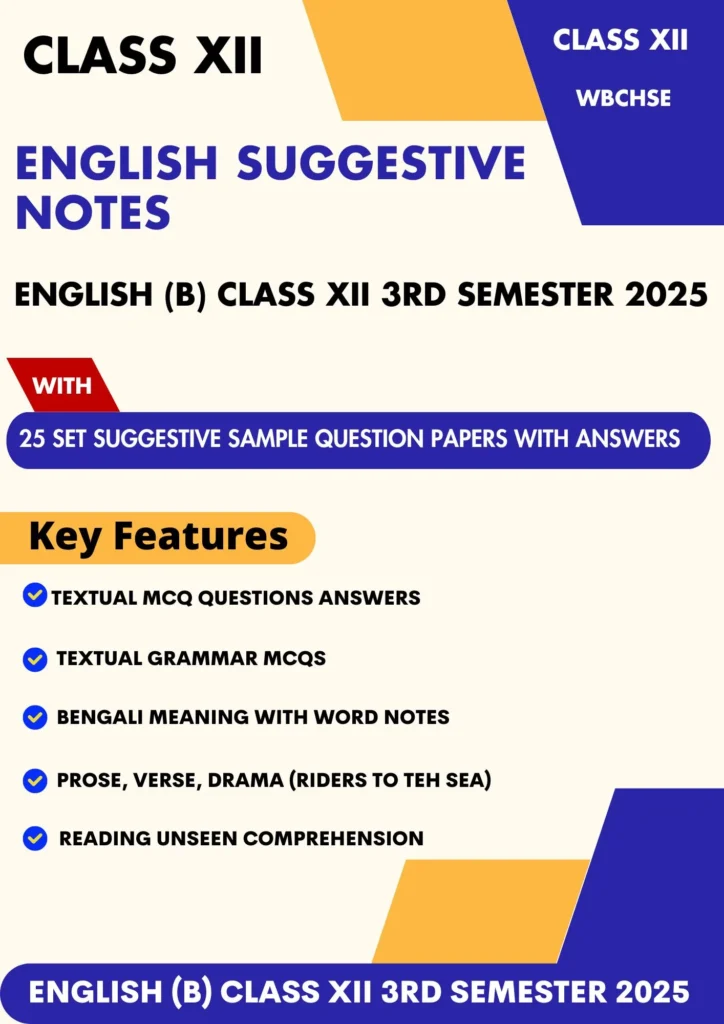
2. Why didn’t the narrator ever break his journey at Deoli?
a) He had no time
b) He feared the truth might spoil the memory
c) He disliked the station
d) He forgot where it was
3. Assertion (A): The narrator returned to Dehra earlier than usual after college.
Reason (R): He was eager to meet the basket girl at Deoli again.
a) Both A and R are true, and R is the correct explanation of A.
b) Both A and R are true, but R is not the correct explanation of A.
c) A is true, but R is false.
d) A is false, but R is true.
4. Assertion (A): The narrator asked the station-master about the girl.
Reason (R): He wanted to help her start a business in Dehra.
a) Both A and R are true, and R is the correct explanation of A.
b) Both A and R are true, but R is not the correct explanation of A.
c) A is true, but R is false.
d) A is false, but R is true.
5. Match the items in Column A with their corresponding descriptions in Column B.
| Column A | Column B |
| A. The Narrator | 1. Symbolizes fleeting connections and emotional longing |
| B. The Basket Girl | 2. A mysterious figure evoking love and regret |
| C. Deoli Station | 3. A symbol of loneliness, mystery, and missed opportunities |
| D. The Tea Stall Owner | 4. A witness to the narrator’s silent bond with the girl |
Options:
a) A-1, B-2, C-3, D-4
b) A-2, B-1, C-4, D-3
c) A-3, B-4, C-1, D-2
d) A-4, B-3, C-2, D-1
6. What book did the lawyer read after the tenth year?
A) Shakespeare
B) The Bible (Gospel)
C) Plato’s Republic
D) A History of Russia
7. In which year did the lawyer start studying languages, philosophy, and history?
A) Fourth year
B) Sixth year
C) Eighth year
D) Tenth year
8. Assertion (A): The lawyer left his confinement before the bet ended.
Reason (R): He realized that material wealth and worldly pleasures were meaningless.
a) Both A and R are true, and R is the correct explanation of A.
b) Both A and R are true, but R is not the correct explanation of A.
c) A is true, but R is false.
d) A is false, but R is true.
9. Assertion (A): The banker was relieved when the lawyer walked out before the deadline.
Reason (R): The banker had already transferred the money to the lawyer’s account.
a) Both A and R are true, and R is the correct explanation of A.
b) Both A and R are true, but R is not the correct explanation of A.
c) A is true, but R is false.
d) A is false, but R is true.
10. Match the items in Column A with their corresponding descriptions in Column B
| Column A | Column B |
| A. The Banker | 1. Symbolizes materialism and fear of loss |
| B. The Lawyer | 2. Represents the pursuit of knowledge and eventual disillusionment |
| C. The Bet Agreement | 3. A test of human endurance and conflicting values |
| D. The Lawyer’s Final Letter | 4. Rejects material wealth and questions life’s meaning |
Options:
a) A-1, B-2, C-3, D-4
b) A-2, B-3, C-1, D-4
c) A-3, B-4, C-2, D-1
d) A-1, B-3, C-4, D-2
11. What kind of life did Kalam describe from his childhood in Rameswaram?
a) Lavish and luxurious
b) Spiritually rich and secure
c) Isolated and unhappy
d) Uncertain and fearful
12. What core message did Kalam’s father convey about prayer?
a) Prayer is a ritual to seek divine rewards.
b) Prayer helps escape from responsibilities.
c) Prayer is a way to connect with the universal spirit beyond barriers.
d) Prayer is useful only during suffering.
13. Assertion (A): Kalam’s father was deeply respected in the community.
Reason (R): He possessed both material wealth and formal education.
a) Both A and R are true, and R is the correct explanation of A.
b) Both A and R are true, but R is not the correct explanation of A.
c) A is true, but R is false.
d) A is false, but R is true.
14. Assertion (A): Kalam tried to emulate his father’s spiritual outlook in his scientific career.
Reason (R): He believed that science and faith must always remain separate and contradictory.
a) Both A and R are true, and R is the correct explanation of A.
b) Both A and R are true, but R is not the correct explanation of A.
c) A is true, but R is false.
d) A is false, but R is true.
15. Match the items in Column A with their corresponding descriptions in Column B
| Column A | Column B |
| A. Kalam’s Father | 1. Taught deep spiritual values in simple language |
| B. Pakshi Lakshmana Sastry | 2. Priest at the Rameswaram temple and friend of Kalam’s father |
| C. Mosque Street | 3. A place of communal harmony among Hindus and Muslims |
| D. Kalam’s Kitchen Memories | 4. Involved aromatic sambar, pickles, and coconut chutney |
Options:
a) A-1, B-2, C-3, D-4
b) A-2, B-1, C-4, D-3
c) A-3, B-4, C-2, D-1
d) A-1, B-3, C-2, D-4
(Textual Grammar) – 15 marks
Do as Directed:
1. The train reached Deoli at about five in the morning. The station was dimly lit with electric bulbs and oil lamps. (Join into Complex Sentence)
a) The train reached Deoli at about five in the morning, and the station was dimly lit with electric bulbs and oil lamps.
b) When the train reached Deoli at about five in the morning, the station was dimly lit with electric bulbs and oil lamps.
c) The train reached Deoli at about five in the morning; the station was dimly lit with electric bulbs and oil lamps.
d) The train reached Deoli at about five in the morning but the station was dimly lit with electric bulbs and oil lamps.
2. I was eighteen, visiting my grandmother, and the night train stopped at Deoli, a girl came down the platform, selling baskets. (Split the following sentence into two sentences:)
a) I was eighteen, visiting my grandmother. The night train stopped at Deoli. A girl came down the platform selling baskets.
b) I was eighteen and visiting my grandmother. The night train stopped at Deoli, and a girl came down the platform selling baskets.
c) I was eighteen visiting my grandmother. The night train stopped at Deoli and a girl came down the platform selling baskets.
d) I was eighteen, visiting my grandmother, and the night train stopped at Deoli, where a girl came down the platform selling baskets.
3. The girl said, “Do you want to buy a basket? They are very strong, made of the finest cane.” (Change the narration from Direct to Indirect.)
a) The girl asked if I wanted to buy a basket and told me that they were very strong and made of the finest cane.
b) The girl asked me if I want to buy a basket and told me they are very strong and made of the finest cane.
c) The girl asked me if I wanted to buy a basket, stating that they were very strong and made of the finest cane.
d) The girl asked, “Do you want to buy a basket?” and she told me they are very strong, made of the finest cane.
4. “I will come again,” I said. “Will you be here?” (Change the narration from Direct to Indirect.)
a) I said that I would come again and asked if she would be there.
b) I said that I would come again and asked if she was there.
c) I said, “I will come again,” and asked if she would be here.
d) I said that I would come again, and asked her if she was going to be there.
5. The girl _______ me for one of the baskets, but I caught her hand and held it. (Choose the correct option to fill in the blank.)
a) asked
b) was asking
c) had asked
d) ask
6. “The banker, who was younger and more nervous in those days, was suddenly carried away by excitement.” “He struck the table with his fist and shouted at the young man.” (Combine the following sentences into one)
A. The banker, who was younger and more nervous in those days, struck the table with his fist and shouted at the young man, suddenly carried away by excitement.
B. The banker, suddenly carried away by excitement, who was younger and more nervous in those days, struck the table with his fist and shouted at the young man.
C. The banker struck the table with his fist, who was younger and more nervous in those days, and shouted at the young man, suddenly carried away by excitement.
D. The banker was carried away by excitement and struck the table with his fist, shouting at the young man, who was younger and more nervous in those days.
7. “It was dark and cold in the garden, and rain was falling.” (Split the following sentence into two sentences)
A. It was dark and cold in the garden. Rain was falling.
B. The garden was dark and cold, and the rain was falling.
C. The garden was dark and cold, while rain fell.
D. It was dark, and the garden was cold, with rain falling.
8. The banker said, “If you mean that in earnest, I’ll take the bet, but I would stay not five but fifteen years.” (Change the following sentence from direct to indirect narration)
A. The banker said that if he meant that in earnest, he would take the bet, but he would stay not five but fifteen years.
B. The banker said that if he meant that in earnest, he will take the bet, but he would stay not five but fifteen years.
C. The banker said that if he meant that in earnest, he would take the bet, but would stay for fifteen years.
D. The banker said if he meant that in earnest, he would take the bet but he would stay fifteen years.
9. The prisoner said he despised freedom, life, and health, and all that in the books was called the good things of the world. (Change the following sentence from indirect to direct narration:)
A. “I despise freedom, life, and health, and all that in your books is called the good things of the world,” said the prisoner.
B. The prisoner said, “I despise freedom, life, and health, and all that in the books is called the good things of the world.”
C. “I despise freedom, life, and health, and all that is called good in your books,” said the prisoner.
D. The prisoner said, “I despise freedom, life, and health, and all that is called good in your books.”
10. The young lawyer took the bet, but he didn’t realize how much he ______ for the next fifteen years. (Fill in the blank with the correct option)
A. will suffer
B. would suffer
C. suffers
D. suffered
11. He had neither much formal education. He had no wealth. (Join the following sentences into a single one)
A. He had either formal education or wealth.
B. He had both formal education and wealth.
C. He had neither much formal education nor wealth.
D. He did not have formal education but had wealth.
12. Whenever they are in trouble, they look for someone to help them. (Split the sentence)
A. People are often busy. They love to help others.
B. They are always calm. They avoid troubles.
C. They are in trouble. They don’t need help.
D. They are in trouble. They look for someone.
13. My father told me, “There is nothing mysterious about prayer.” (Change the narration)
A. My father told me that there was nothing mysterious about prayer.
B. My father said that there is nothing mysterious about prayer.
C. My father says that there is nothing mysterious about prayer.
D. My father told that there is nothing mysterious about prayer.
14. “Why don’t you say this to the people who come to you for help and advice?” I asked my father. (Change the narration)
A. I asked my father that why he didn’t say this to the people who come to him for help and advice.
B. I asked my father why he didn’t say that to the people who came to him for help and advice.
C. I asked my father why he didn’t say that to the people who had come to him for help and advice.
D. I asked my father why didn’t he say that to the people who came to him for help and advice.
15. My father _________ all inessential comforts and luxuries. (Fill in the blank with the correct form)
A. avoid
B. avoids
C. avoided
D. was avoiding
(Unseen Comprehension) – 10 marks
1. Read the following passage and answer the questions that follow:
The world is not only hungry but it is also thirsty for water. This may seem strange to you, since nearly 70 percent of the earth’s surface is covered with water. But about 97 percent of this huge amount is sea-water or salt water. Man can only drink and use the other 3 percent-the fresh water that comes from the rivers, lakes, underground and other sources. And we cannot use even all of that because some of it is in the form of icebergs and glaciers. Even worse, some of it has been polluted. However, this small amount of fresh water which is constantly being replaced by rainfall is still enough for us. But our need for water is increasing rapidly-almost day by day because of population increase. We must take steps to deal with this problem now. We can avoid a severe worldwide water shortage later on. A limited water supply would have a bad effect on agriculture and industry. Do you know that to produce a single ton of steel it takes about 91,000 litres of water? We all have to learn how to stop wasting our precious water. One of the first steps is, we have to develop ways of preserving it. Experiment has already been done in this field, but only on a small scale. The systems that have been worked out resemble those used in spacecraft.
Choose the most appropriate answer from the following options:
1. If fresh water resources continue to be misused, which of the following sectors is most likely to face serious challenges first?
A. Information Technology
B. Entertainment
C. Agriculture
D. Transportation
2. Why is the development of spacecraft-style water preservation systems important in today’s world?
A. Because water in space is purer
B. Because they are inexpensive and already widespread
C. Because they offer models for efficient water recycling on Earth
D. Because they can desalinate sea water quickly
3. Assertion (A): There is a water shortage in the world.
Reason (R): 97% of the earth’s water is salt water and cannot be used by humans.
A. Both A and R are true, and R is the correct explanation of A.
B. Both A and R are true, but R is not the correct explanation of A.
C. A is true, but R is false.
D. A is false, but R is true.
4. Assertion (A): A limited water supply can affect industries.
Reason (R): Producing one ton of steel requires a huge amount of water.
A. Both A and R are true, and R is the correct explanation of A.
B. Both A and R are true, but R is not the correct explanation of A.
C. A is true, but R is false.
D. A is false, but R is true.
5. Match the items in Column A with those in Column B:
| Column A | Column B |
| A. Sea water | 1. 3% of earth’s water |
| B. Fresh water | 2. Can’t be used by humans |
| C. Icebergs & glaciers | 3. Frozen sources of fresh water |
| D. Rainfall | 4. Replenishes fresh water |
Choose the correct combination:
A. A-2, B-1, C-3, D-4
B. A-1, B-2, C-3, D-4
C. A-2, B-4, C-1, D-3
D. A-3, B-1, C-4, D-2
6. “We must take steps to deal with this problem now.” (Turn into complex sentence)
A. We must take steps now dealing with this problem.
B. We must take steps so that we can deal with this problem now.
C. We must take steps and we deal with this problem now.
D. We must now take steps to deal the problem.
7. “We all have to learn how to stop wasting our precious water.” (Change the voice)
A. How to stop wasting our precious water has to be learned by us all.
B. How to be stopped wasting our precious water is to be learned by all.
C. We all have to be learned to stop wasting our precious water.
D. Wasting our precious water should be learning by us.
8. “The preservation of water is important.” (Rewrite using the verb form of ‘preservation’)
A. Preserve of water is important.
B. Preserving water is important.
C. It is important to preserve water.
D. Water preserve is important.
9. Find the word from the passage similar in meaning to: “clean or pure”
A. Thirsty
B. Precious
C. Fresh
D. Preserved
10. Find the word from the passage similar in meaning to: “test or trial”
A. Resemble
B. Experiment
C. Problem
D. Develop

